By Mariana Aldrigui
We often find ourselves surrounded by new expressions—sometimes not so new, but chosen to shape discussions—and tourism is no exception. For many years, academia has debated the importance of prioritising local values over the massification of experiences, as it is precisely authenticity and uniqueness that make destinations more or less competitive. One approach to emphasise the authenticity of a destination is through Community-Based Tourism, or CBT.
In one of many definitions, proposed by E-Ruiz Ballesteros in a 2022 article, community-based tourism is described as “a way of organising tourism activities while ensuring a consistent impact on the community’s configuration, defined by reciprocity and collective actions.”
The key distinction of community-based tourism lies in the full involvement of the community—not merely as low-wage workers or as a backdrop for visitors, as is often the case with vertically integrated operations. The dynamics of local life, with a special focus on culture, environmental relationships, gastronomy, lifestyle, and daily habits (without over-sanitisation or forced performance), are fundamental to structuring the experiences that will be presented, sold, and shared with visitors. Local residents decide what to present, how to present it, and how responsibilities will be distributed so that the financial revenue directly benefits those involved, rather than being concentrated in the hands of intermediaries unconnected to the region.
The growing demand for authentic experiences from tourists worldwide has increased interest in destinations that enable direct interaction between visitors and different communities. Simultaneously, greater access to information and rising awareness among previously overlooked groups have helped spread this practice, fostering a sense of identity, belonging, and environmental preservation.
In Brazil, several CBT initiatives have gained prominence. A notable example is the Uakari Lodge in the Mamirauá Sustainable Development Reserve, Amazonas. Managed in partnership with local communities, this lodge has been a successful model of promoting sustainable ecotourism in the Amazon. Another example is the Tucum Network in Ceará, which connects coastal communities to offer authentic tourism experiences while protecting and valuing local cultures.
There are also noteworthy international examples, most of which are in developing countries. In Thailand, Local Alike promotes responsible tourism experiences that directly involve local communities in managing tourism activities. In Colombia, initiatives like those offered by Taroa Adventures in Barú provide tourists with direct contact with local culture through traditional cuisine and stories shared by residents.
One of the primary challenges of CBT is the commodification of local culture. As communities gain recognition and receive more visitors, there is a tendency to turn traditions into products, which can lead to a loss of cultural authenticity. This transformation often results in a singular, static narrative that fails to reflect the diversity and complexity of local cultures. Excessive focus on attracting tourists can distort cultural practices, reducing them to mere settings for social media posts.
CBT, however, faces significant challenges, such as balancing economic development with cultural and environmental conservation. Additionally, issues related to managing tourism and its impact on communities remain. With proper planning, moderated goals, and supportive public policies, CBT can continue to grow as a viable alternative to traditional tourism, promoting fairer and more sustainable development for the communities involved.
Equally important is the education and awareness of both tourists and communities, which are essential for CBT’s success. Tourists must be informed about how to engage respectfully with local cultures while minimising their environmental impact. Similarly, communities must be empowered to manage their tourism initiatives responsibly and effectively, ensuring that their cultural values are respected and preserved.
Ruiz-Ballesteros, E. (2022). What community for community-based tourism?. Current Issues in Tourism, 26, 2664–2677. https://doi.org/10.1080/13683500.2022.2091982
Mariana Aldrigui is a professor and tourism researcher at the University of São Paulo (USP). She specialises in Brazilian tourism and contextualising trends.


